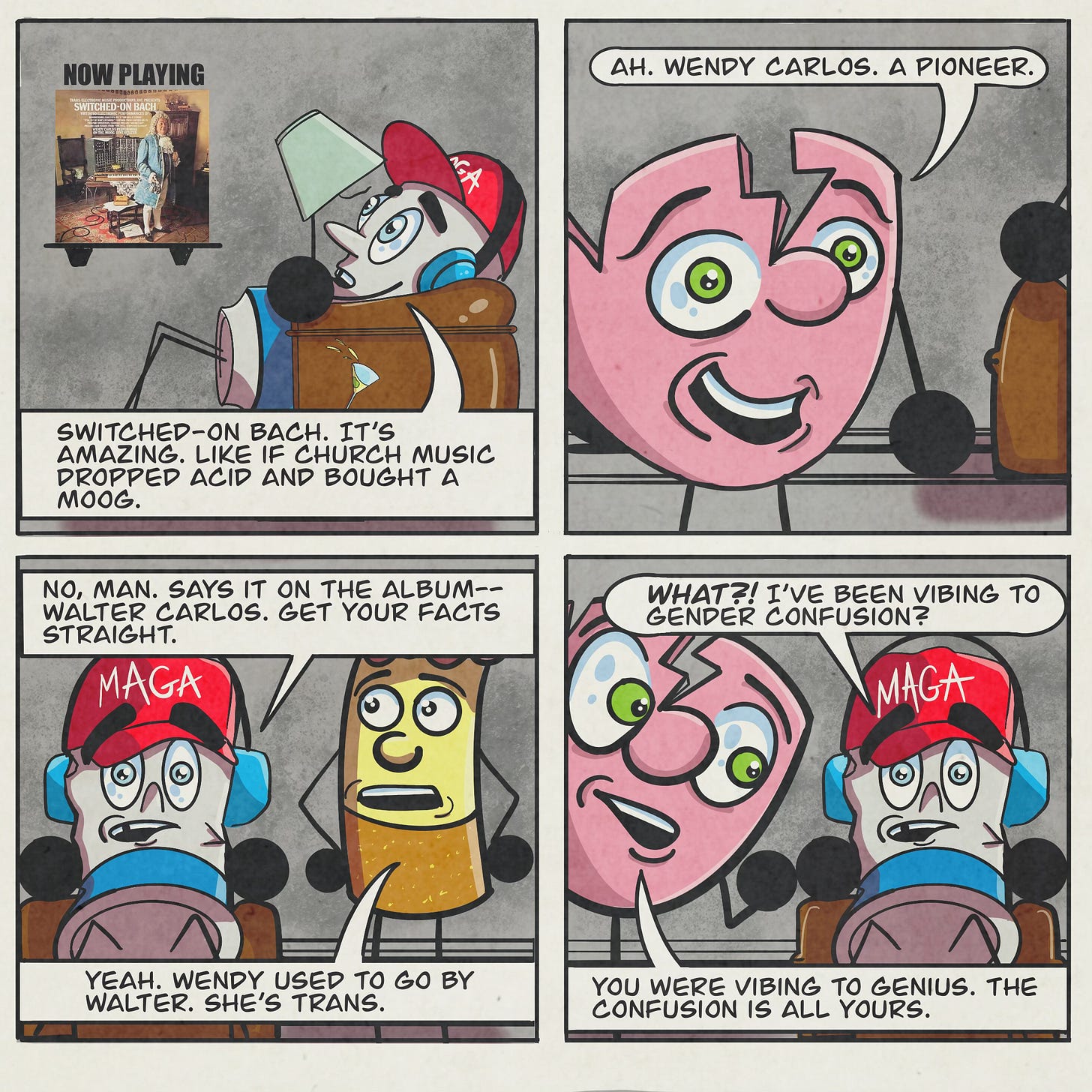**This comic popped into my brain as I was organizing my vinyl records.**
Back in high school, my friends and I would get into heated debates—not about sports or prom dates—but about our favorite classical composer. Was it Bach, Beethoven, or Mozart? There were plenty to choose from, sure, but those three were always the holy trinity.
The funny thing? We were all in metal bands. Shredding guitars by night, but secretly swooning over Baroque counterpoint by day. Guys like Yngwie Malmsteen made that connection easy—he brought Bach to the fretboard like a lightning bolt in leather pants. Inspired, we all tried (and mostly failed) to master Bach’s Two-Part Invention No. 4 in D Minor on the piano. Some of us even jammed it out with one part on guitar and the other on bass. I remember recording a few classical pieces on the bass myself. That love never left.
Then one day in the ‘80s, I stumbled across Switched-On Bach by Wendy Carlos—a revelation. Bach on a Moog synthesizer? It was like aliens had landed and decided to throw a Baroque rave. I was instantly obsessed. To this day, if I hear a Moog, I’m in.
But shortly after I bought the album, someone felt the need to “inform” me that Wendy Carlos was born Walter Carlos. “She’s a man,” they said. Not “she transitioned,” not “she’s a trans woman.” Just: “She’s a man.” I don’t remember exactly how I reacted—maybe with confusion or discomfort. But one thing I know for sure: it didn’t change how the music made me feel.
The same thing happened when I gave a report on David Bowie in class. After I finished, the class clown—pretty sure his name was Scott—asked, “Is Bowie gay?” The room erupted in laughter. I didn’t flinch. I told them he was bisexual. I saw the teacher give me a subtle nod. Maybe for the report. Maybe for not playing into the juvenile nonsense. Maybe both.
Back then, being gay was the taboo. Now, it’s trans rights that are in the crosshairs. And while things are better, we’re still a long way from good. Wendy Carlos released Switched-On Bach in 1968 under the name Walter, and the album absolutely crushed. It hit #10 on the Billboard 200, dominated the classical charts for years, sold over a million copies, and won multiple Grammys. She came out as trans in a 1979 Playboy interview—bold move, considering how hard it still is today.
Wendy once said she’d always been concerned with liberation and just wanted to liberate herself. That hit me. Because really, why should an artist’s gender or sexuality matter to anyone consuming their art? If it doesn’t hurt you, why let it bother you?
In my comic, Bud enjoys Wendy Carlos’s music—until he learns she’s trans. Suddenly, he feels like the synth has been “tainted.” Like transness is contagious. Joe steps in to remind him that Wendy isn’t the one who’s confused—Bud is. And the only real cure for that confusion is education and exposure. Most transphobia isn’t rooted in experience—it’s rooted in ignorance.
Back in 1966, New York sexologist Harry Benjamin published The Transsexual Phenomenon, a book that helped guide Carlos’s own journey. That was almost 60 years ago. There’s no shortage of information—just a shortage of willingness to read it.
Look, I’m not trying to start a war on TikTok (though who knows, maybe I will). My comics don’t hand out answers—they ask questions. I hope those questions spark meaningful dialogue. But yeah… sometimes it’s just noise.
Still, I think it’s worth making the art that asks anyway.


